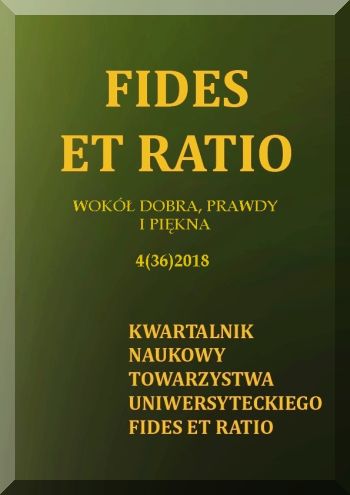Abstract
Beauty of human body is the inspiration for human creativity. As time goes by, during one`s live, the shape of his body changes. The aim of this article is to discuss the human intellectual perception of beauty of the particular human being`s body already in the first stage of his development as a zygote (ootid). Inspiration for presented order of thoughts came from works of Thomas Aquinas. Capturing the beauty of the particular human being`s body in early stages of his development may provide new arguments especially in reflection on new medical procedures such as assisted reproductive technology (ART) and pharmaceuticals influencing human fertility. Intellect allows us to notice beauty of the body of the particular human being; and even if his body consists only of one cell, our intellect puts this human being (ootid) in the same category equally with other representatives of the species
Homo sapiens in all ages. Thomas Aquinas calls it aequiparantia. This equality is consequent to perfection of forma substantialis and proprium esse of human being-embryo (even ootid) who possesses them both after animatio occurring already in the first cell of particular human being`s body.
References
Eco U. (1970), Il problema estetico in Tomaso d`Aquino, Milano: Ed. Valentino Bompiani.
Jaroszyński P. (2002), Spór o piękno, Kraków: Oficyna Wydawnicza Impuls.
Krokos J. (2004), Sumienie jako poznanie. Fenomenologiczne dopełnienie Tomaszowej nauki o sumieniu, Warszawa: Wydawnictwo UKSW.
Roszak P. (2012), Wyjątkowość człowieczeństwa Chrystusa, w którym „mieszka cała pełnia” (Kol. 2, 9) według św. Tomasza z Akwinu, (w:) Tomasz z Akwinu Wykład Listu do Kolosan, P. Roszak (red.) tłum. I. Mikołajczyk i P. Roszak, s. 269-292, Toruń: Wydawnictwo Naukowe UMK.
Stein E. (1995), Byt skończony i byt wieczny, tłum. I. Adamska, Kraków: Wyd. OO. Karmelitów Bosych.
Tomasz z Akwinu -w wersji łacińskiej dostępne on-line pod adresem: http://www.corpusthomisticum.org/iopera.html
Tomasz z Akwinu, Commentaria Biblica: Super Epistolam B. Pauli ad Colossenses lectura (Super Col), Super Iob (Super Io), Super Joannem (Super Joan),
Tomasz z Akwinu, Compendium Theologiae (CTh),
Tomasz z Akwinu, De Veritate (De Ver),
Tomasz z Akwinu, De Virtutibus (De virtutibus),
Tomasz z Akwinu, Sententia libri politicorum (Sententia politic)
Tomasz z Akwinu, Sententia methaphysicae
Tomasz z Akwinu, Scriptum super Sententiis (Super Sent)
Tomasz z Akwinu, Summa contra Gentiles (ScG),
Tomasz z Akwinu, Summa Theologiae (STh),
Tomasz z Akwinu, Questio disputata de Anima (Qdde Anima),
Tomasz z Akwinu, Questiones de Quodlibet (Quodlibet),
Torrell J.-P. (2003), Święty Tomasz z Akwinu Mistrz duchowy, Poznań: W Drodze.
Zajączkowska M. (2016), Zrodzenie człowieka, (w:) Szczęśliwe małżeństwo i rodzina, I. Grochowska i P. Mazanka (red.), s. 113-138, Warszawa: Wydawnictwo UKSW.
